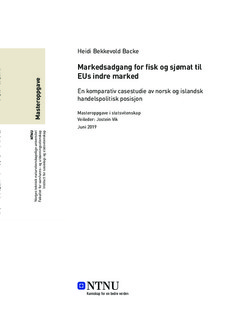| dc.description.abstract | This paper questions the nature of and the considerations behind the Norwegian and the Icelandic governments’ trade policies for ensuring market access to the EU for their seafood exports. Both countries have declined membership to the EU, which is their foremost market, and their considerable volumes of seafood exports are subject to extensive import tariffs. Whereas previous trade literature explains the absence of free trade with the presence of protectionist interests and institutions, this paper aims to offer a nuanced picture of the conditions explaining a government’s choice of trade policy. Through an empirically oriented comparative case study, the organization of Norwegian and Icelandic trade politics in the field of seafood exports are assessed and compared. The following conclusions are made: the organization of both countries’ trade politics in the matter is based upon historically contingent trade agreements and a cautious political strategy of keeping the seafood interests separate from other trade interests. In the presence of domestic and foreign pressure, the Norwegians keep to the strategy while the Icelandic government recently has allowed for an interest linkage and is now starting to show tendencies of a more offensive tone towards the EU. Concerning the conditions explaining the countries’ choices of trade policies, the following testable factors are identified: “presence of defensive trade interests”, “tough trade partner with opposite trade interests”, “conflicting ideas about international trade”, “other offensive, lucrative industries”, and “domestic pressure”. The two countries are similar on all factors except the two latter. The similarities might explain why the countries have both been “deviant” cases, organizing their trade policies in similar ways. The differences on the testable factors might explain why the two countries are now starting to diverge in their trade political approach towards the EU. | |
